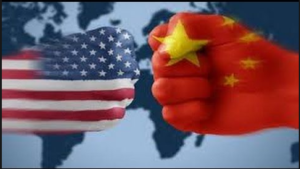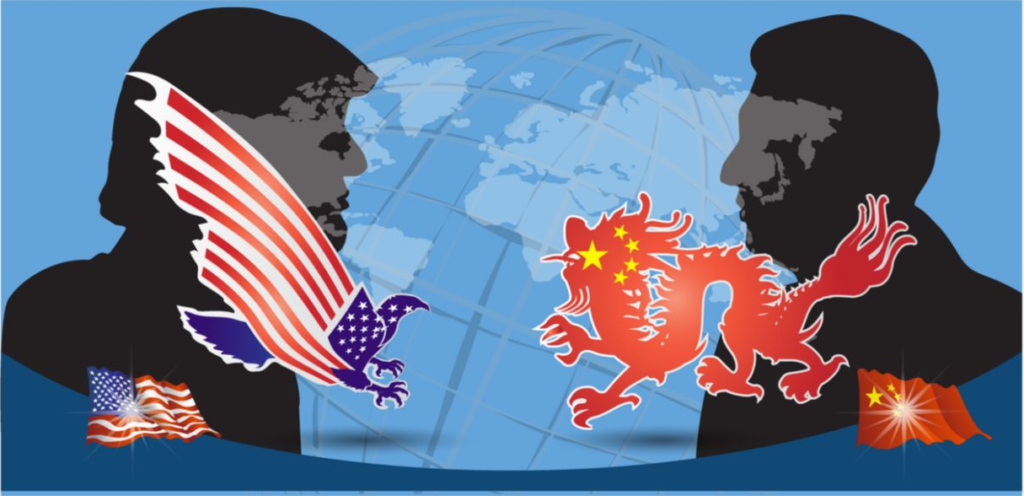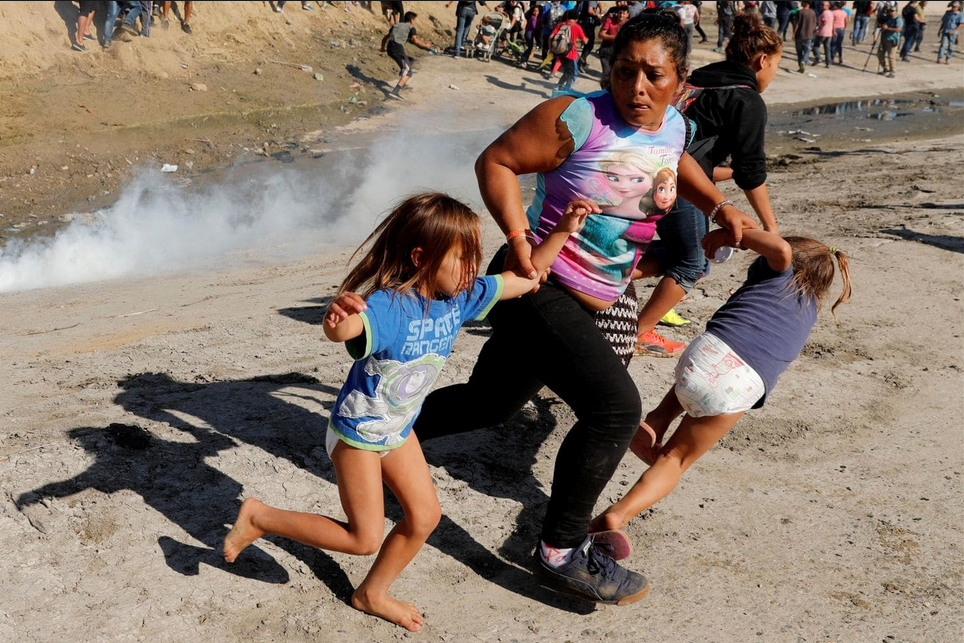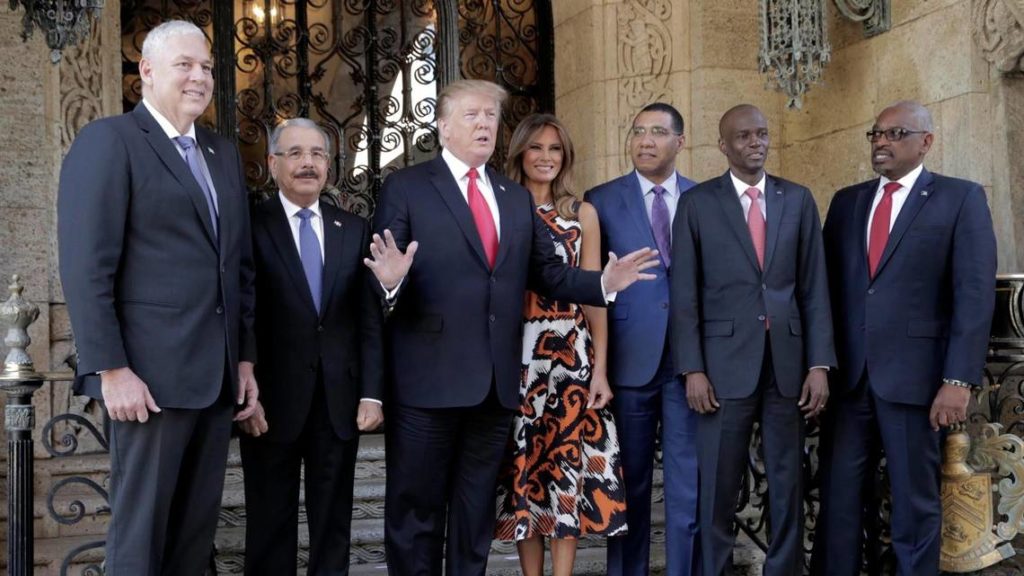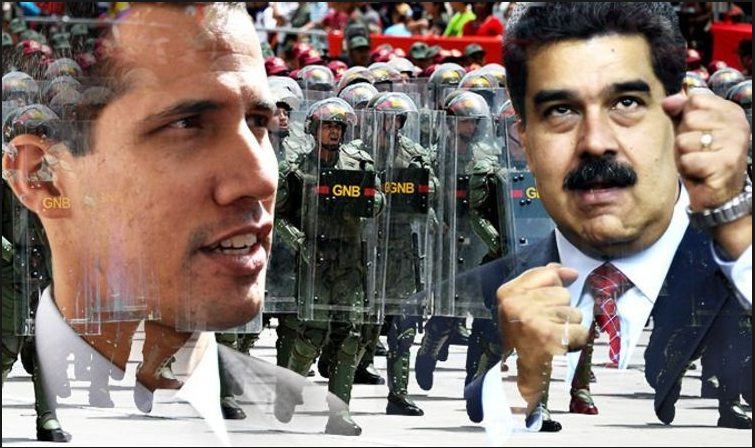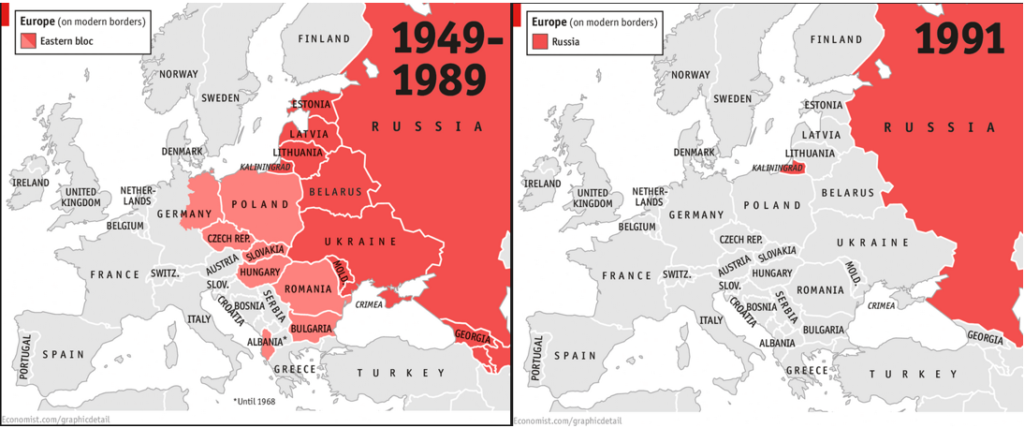[Note: I have written 4,135 commentaries on this weblog over the past 15 years. What follows is the longest by far … Reports are that even a 33-character tweet tests the attention span of most people these days. Therefore, I fully appreciate how daring (or foolish) it is to publish this 21,000-character commentary. And no, this is no April Fool’s Day joke.
As the title indicates, this commentary led inexorably into so many geopolitical streams, the length was unavoidable. In deference to your attention span, however, I won’t publish another commentary this week. So read this one in bits … if that’s what it takes.]
China Encroaching
Ever since the end of the Cold War, China’s influence supplanting America’s has defined the geopolitics of the Americas. This, in furtherance of China’s manifest destiny to change the global balance of power, which has already seen it encroach on America’s sphere of influence on every continent.
America predicated its influence on cultivating shared values. China predicates its influence on manipulating mutual interests.
For example, China has induced nearly every developing country to betray diplomatic relations with Taiwan. And, in most cases, it did so by offering to finance everything from sports stadiums and resort hotels to deep-water ports and other development projects.
‘Nearly every island in the Caribbean, from the smallest on up, currently has a substantial investment from China,’ said David Jessop, managing director of the Caribbean Council, a London-based consultancy that works with Caribbean governments. ‘It seems that what nobody knows is what is motivating China.’
(Public Radio International, April 21, 2011)
Except that it does not take an expert in geopolitics to figure out “what is motivating China.” Even I have been writing/warning about its motivation for years.
Here, for example, is the alarm I sounded over a decade ago in “China Buying Political Dominion over the Caribbean (Latin America and Africa),” February 22, 2005:
____________________
Vice President Zeng Qinghong is expected to consolidate China’s geopolitical strategy of co-opting the economies of the Caribbean. He reveled in the Santa Claus-like reception he got at every port of call during his tour of the region.
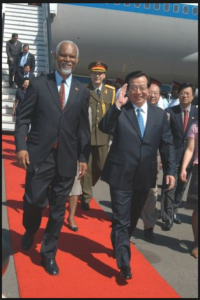 However, allusions to Christopher Columbus might be more fitting. Because the Chinese search for new markets is really a quest for dominion. And, with massive direct investments and Chinese tourists boosting visits to unprecedented levels, China will soon become indispensable to countries throughout the Caribbean, Latin America, and Africa. Naturally, this would enable China to exercise unprecedented and unchallengeable political influence. …
However, allusions to Christopher Columbus might be more fitting. Because the Chinese search for new markets is really a quest for dominion. And, with massive direct investments and Chinese tourists boosting visits to unprecedented levels, China will soon become indispensable to countries throughout the Caribbean, Latin America, and Africa. Naturally, this would enable China to exercise unprecedented and unchallengeable political influence. …
What happens if China decides that converting the container ports, factories, and chemical plants it has funded throughout the Caribbean into dual military and commercial use is in its geostrategic interest? Would these countries comply? Would they have any real choice? And when they do comply, would the U.S. then blockade the island(s) at issue, namely the way it blockaded Cuba during the Missile Crisis?
Now consider China making similar strategic moves in Latin America where its purportedly benign Yuan diplomacy dwarfs its Caribbean operations. This new Cold War could then turn very hot indeed.
____________________
I continued my Cassandra-like warnings in many subsequent commentaries, including “China Putting Squeeze on The Bahamas. Your Country Could Be Next,” October 22, 2010, “China’s Deficit? No Moral Authority to Lead,” November 16, 2011, and “China Invading US Sphere of Influence in Caribbean,” April 11, 2012, which includes this fateful assessment:
The United States ended up on its costly 10-year misadventure in Afghanistan because it left its flank exposed in that region after helping the Afghan Mujahideen defeat the Soviet Union. Now it seems doomed to end up on another costly, even if less bloody, misadventure. This time in the Caribbean (to reclaim its sphere of influence from China) because it left its flank exposed in that region after winning the Cold War.
Stupid Americans … they’ll never learn.
America has been preoccupied with Vietnam-style wars in Afghanistan and Iraq for the past 18 years. This provided the perfect opportunity for China to supplant it as a superpower patron to countries not just throughout the Americas but around the world.
More to the point, America wasted trillions fighting those unwinnable wars. But its political and security interests would have been far better served if it had spent just a fraction of that amount on development projects in its own backyard.
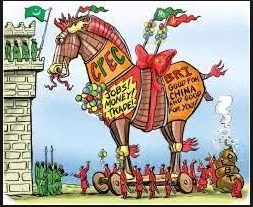 That said, developing countries could be forgiven for seeing China’s direct investments not as a gift horse but as a Trojan horse, which I fear many of its foreign direct investments will turn out to be. Just ask Sri Lanka:
That said, developing countries could be forgiven for seeing China’s direct investments not as a gift horse but as a Trojan horse, which I fear many of its foreign direct investments will turn out to be. Just ask Sri Lanka:
Every time Sri Lanka’s president, Mahinda Rajapaksa, turned to his Chinese allies for loans and assistance with an ambitious port project, the answer was yes.
[But] Sri Lanka’s new government struggled to make payments on the debt he had taken on. Under heavy pressure and after months of negotiations with the Chinese, the government handed over the port and 15,000 acres of land around it for 99 years in December.
The transfer gave China control of territory just a few hundred miles off the shores of a rival, India, and a strategic foothold along a critical commercial and military waterway.
(The New York Times, June 25, 2018)
I warned poor countries about such structured debt traps in commentaries like “World Beware: China Calling In (Loan-Sharking) Debts,” February 3, 2010 and “Countries Queuing Up to Become as Indebted to China as US,” September 15, 2011.
Yet still I had cause to bemoan its adhesive debt-collection tactics in “China Using Loans to ‘Colonize’ Developing World,” August 20, 2018.
President Trump is utterly clueless about practically every geopolitical issue. But he seems to have an idiot savant’s understanding that China poses as many challenges to America’s economic power today as the Soviet Union posed to its military power during the Cold War.
Except that every US president proved eminently capable of dealing with the challenges the Soviet Union posed. But Trump seems uniquely incapable of dealing with those China poses: Exhibit A is the self-defeating trade war he launched nearly a year ago.
President Trump insists that his trade war will make America better off. … But it is small-business owners like Mr. Vari, and his customers, who are largely footing the bill for Mr. Trump’s tariffs. …
While details [of a trade agreement] are still being discussed, the agreement does not appear to require the sweeping changes to China’s economy that prompted Mr. Trump to begin the trade war.
(The New York Times, March 4, 2019)
Duh.
Meanwhile, this trade war is being surpassed in its harebrained fecklessness by Trump insisting that his public wooing of Kim Jong-un will get North Korea to denuclearize. Reports are that Trump has only succeeded in showing the world that this malevolent dictator is actually more affable, likable, and sensible than he. But I digress …
Migrants Caravanning
America is facing a seemingly intractable migration crisis on the US-Mexico border. But, as I asserted above, it could have avoided this crisis. It only needed to spend relatively little time and money in recent years helping countries in Central America combat the root causes, most notably chronic poverty and gang violence. Not least because the latter is often related to the trafficking of drugs that end up hooking and killing thousands of Americans each year.
I wrote at length about the manifest necessity of engaging in this combat in “Separating Migrant Children from Parents. This Is America … Too!” June 20, 2018, and “Despite Trump, This Migrant Caravan Must Be Stopped!” October 22, 2018.
I duly criticized Trump for failing to deal with this migration crisis. But I also criticized his Democratic critics for failing to delineate steps they would take to stem the untenable and unsustainable flow of migrants. However, those commentaries are still so fresh, I see no point in elaborating.
US Retreating
For reasons we now understand all too well, America’s xenophobic and impetuous president has just made this migration crisis much worse:
In a stunning about-face, State Department officials said that President Donald Trump is cutting off all direct assistance to the so-called Northern Triangle countries of El Salvador, Honduras and Guatemala.
These three countries are the primary source of migrants to the U.S.
(ABC News, March 30, 2019)
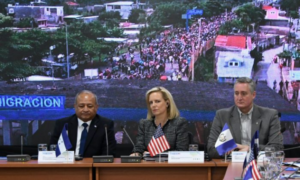 In typical Captain-Chaos fashion, Trump tweeted this about-face less than 48 hours after his secretary of Homeland Security, Kirstjen M. Nielsen, signed a “first-of-its-kind” regional agreement in Tegucigalpa, Honduras.
In typical Captain-Chaos fashion, Trump tweeted this about-face less than 48 hours after his secretary of Homeland Security, Kirstjen M. Nielsen, signed a “first-of-its-kind” regional agreement in Tegucigalpa, Honduras.
‘I look forward to implementing this historic agreement and working with my Northern Triangle counterparts to help secure all of our nations and to end the humanitarian and security crisis we face,’ said Nielsen.
The MOC – the first ever multilateral compact on border security – aims to better synchronize cooperation between the countries in order to bolster border security, prevent the formation of new migrant caravans, and address the root causes of the migration crisis through better synchronized efforts.
(Department of Homeland Security, Press Release: March 28, 2019)
This agreement makes clear why cutting off direct assistance would be tantamount to cutting off one’s nose to spite one’s face. The consequences would be devastating. Yet they would pale in comparison with those that would befall both the United States and all of Central America if Trump follows through on his boy-who-cried-wolf threat to close the US-Mexico border this week.
Foremost, don’t be surprised if the leader in each of those Northern Triangle countries reacts with his own version of Fidel Castro’s Mariel boatlift. I warned about this in “Despite Trump, This Migrant Caravan Must Be Stopped!” October 22, 2018, which I referenced above at “Migrants Caravanning.”
You can’t make this stuff up, folks.
CARICOM Flailing
Much is being made of the ham-handed meeting Trump held with CARICOM leaders on March 22 at his Mar-a-Lago resort in Florida.
Among the attendees were Prime Minister Allen Chastanet of Saint Lucia, Prime Minister Dr. Hubert Minnis of The Bahamas, Prime Minister Andrew Holness of Jamaica, and President Jovenel Moise of Haiti, all CARICOM member states, along with President Danilo Medina of the Dominican Republic.
One of the potential results of the meeting involving US investment drew the ire of [Antigua and Barbuda Prime Minister Gaston] Browne, and he stated that it was apparent that CARICOM’s solidarity is being undermined by those who are also determined to relegate the region to an object of history.
‘The irony about all this, Overseas Private Investment Corporation (OPIC) is already operating in these countries, and China offers better credit terms: developmental loans over 20 years at 2 percent interest with a five-year moratorium,’ Browne contended.
(Caribbean News Now, March 27, 2019)
Frankly, I find the ire this meeting incited bemusing. Not least because it manifested in other CARICOM leaders calling those who attended everything from weak-minded dupes to high-minded traitors.
No doubt their meeting with Trump would have been far more effective if they were speaking with one regional voice. Indeed, regional leaders founded CARICOM precisely to leverage their collective influence in dealings with major powers like the United States, China, and the European Union.
Except that anyone who knows anything about CARICOM knows that, as sensible as such solidarity would be, its leaders have never shown it to any significant degree. I have written many commentaries lamenting this fact. But here is how I crystallized my lamentation in “CARICOM and Its Groundhog Meetings,” February 21, 2013:
____________________
The Heads had discussions on redoubling integration efforts, strengthening regional crime and security measures, bolstering regional trade, preserving tax haven status consistent with extraterritorial demands from the United States, among other items.
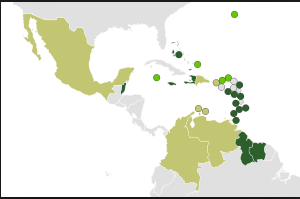 But I know all too well that, despite the seriousness of these matters, discussions on them hold no real consequences. For nothing has distinguished CARICOM throughout its forty-year history quite like the failure of lofty words to find habitation in actual deeds.
But I know all too well that, despite the seriousness of these matters, discussions on them hold no real consequences. For nothing has distinguished CARICOM throughout its forty-year history quite like the failure of lofty words to find habitation in actual deeds.
From day one, for example, the Heads spoke of the ‘free movement of skills and professional persons’ as a founding, fundamental principle. Yet, since then, more discussions have been held at CARICOM meetings on ways to limit such free movement than on ways to facilitate it.
I am mindful that my take on this legacy of futility is hardly authoritative. Therefore, I trust you will find it instructive to know that no less a person than Edwin Carrington, former Secretary-General of CARICOM (1992-2010), felt constrained to lament the following in June 2001 – more than 35 years into ‘the ongoing project we call the CARICOM Single Market and Economy’ and its precursor, the Caribbean Free Trade Agreement:
I am convinced that the dream which was shared by our predecessors of CARICOM being a people and a region united in a common bond promised a great deal which has not yet been achieved.
(ANSA MACAL Breakfast, CARICOM Secretariat, June 22, 2001)
In other words, despite decades of groundhog meetings like the one it held in Haiti this week, Hell will freeze over before CARICOM fulfills its founding promise of regional integration. And all indications are that Carrington’s lament is as relevant today as it was when he made it 13 years ago.
____________________
This is why criticisms in this case seem born more of jealousy than principle.
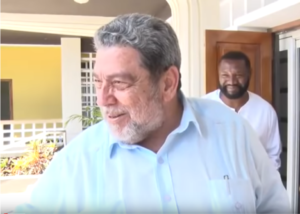 Frankly, I doubt there’s a single CARICOM leader who would have rejected an invitation to attend this meeting. And I say this with all due respect to head critic St. Vincent and Grenadines Prime Minister Dr. Ralph Gonsalves. Honoring Trump’s invitation was, and will always be, the right thing to do.
Frankly, I doubt there’s a single CARICOM leader who would have rejected an invitation to attend this meeting. And I say this with all due respect to head critic St. Vincent and Grenadines Prime Minister Dr. Ralph Gonsalves. Honoring Trump’s invitation was, and will always be, the right thing to do.
Here is just one foreboding illustration of why that is the case:
The Supreme Court upheld Trump’s ban on travel to the United States from Muslim countries. Therefore, this notoriously thin-skinned racist does not even need a colorable pretext to ban all travel from CARICOM countries. Just imagine the disruption that would cause to the lives of all who live in the Caribbean.
In truth, China could invest 1000 times more than the United States throughout the region. Yet nobody residing there would want to even countenance life without the relative ease of being able to shop, vacation, and attend school in the United States.
Moreover, if Trump ordered such a ban, it would not take long for every CARICOM country to become even more of a dysfunctional basket case than Venezuela is today. And, as our Haitian brothers and sisters will attest, we would not be able to seek refuge by walking into neighboring countries the way 3 million Venezuelans have already done.
Not to mention that the people of any CARICOM country would not tolerate, for one month, their leader inflicting upon them the dire straits Venezuelan President Nicolas Maduro has inflicted upon his people for years.
Venezuela Failing
Reports are that Trump met with CARICOM leaders to ensure their support as he escalates his Mexican standoff with Maduro. The tipping point in this standoff came in late January. That’s when Trump
- ordered US recognition of Venezuela’s National Assembly leader Juan Guaido as the country’s legitimate leader, providing cover for other countries to do the same but obliging China and Russia to declare their continuing support for Maduro; and
- demanded Maduro’s ouster, drawing the kind of red line he criticized former President Obama for drawing with respect to Syria, when he demanded that Assad must go.
[Trump] promised them that a high-level delegation from the Overseas Private Investment Corporation [OPIC], the U.S. development lender, would visit their nations in the next 90 days, the White House said. …
[CARICOM] has officially advocated for talks between President Nicolas Maduro and Guaido, and most of its members have rejected resolutions by the Organization of American States supporting Guaido. The backing of the five for Guaido led to the meeting with Trump.
(Reuters, March 22, 2019)
Except that Trump must have OD’d on his own delusions of grandeur when he promised CARICOM leaders investment financing through OPIC. Because it rings about as hollow as former Venezuelan President Hugo Chávez promising them oil financing through PetroCaribe. I sounded alarms with respect to the latter in many commentaries, including “PetroCaribe: Let’s Look This Gift Horse in the Mouth,” June 30, 2006, and “PetroCaribe Chickens Coming Home to Roost,” November 19, 2013. The following is an excerpt from the former:
____________________
If one buys Chávez’s sales pitch, PetroCaribe promises to
contribute to the energy security, socioeconomic development and integration of the Caribbean countries, through the sovereign use of the energy resources.
I am loath to suggest that Chávez is selling snake oil instead of the crude oil that is supposed to fuel this pact. But I have grave misgivings about the viability of PetroCaribe as a reliable source of ‘discounted’ energy for Caribbean countries.
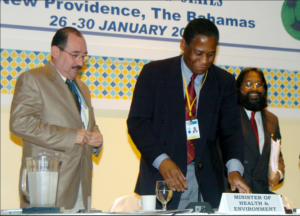 Except that I have no standing. Therefore, I shall cite similar misgivings Bahamian Minister of Energy and Environment Dr. Marcus Bethel voiced during a Senate debate on the 2006/2007 budget. …
Except that I have no standing. Therefore, I shall cite similar misgivings Bahamian Minister of Energy and Environment Dr. Marcus Bethel voiced during a Senate debate on the 2006/2007 budget. …
Dr. Bethel’s deft (technical) explanation suffices as plausible diplomatic cover for any country disinclined to join PetroCaribe. But I feel obliged to expound on its plain meaning:
I have often lamented the failure of Caribbean countries to implement the Caribbean Single Market and Economy (CSME) agreement. And it just so happens that I often cite the Bahamian government’s imperious, parochial and self-interested approach to regional negotiations as a major contributing factor. …
In truth, though, it is just one of many regional governments that seem congenitally averse to regional economic integration. Each seems pathologically confident in its ability to negotiate bilateral agreements that offer far greater benefits than any regional agreement ever could. …
The more intriguing dynamic afoot, however, is the extent to which Chávez is acting in concert with Venezuela’s new political patron, China. Because it is undeniable that, even more than he, Chinese leaders have been strategically buying up political influence throughout the Caribbean and Latin America in recent years.
Except that the Soviet Union saw Fidel Castro as a useful idiot to antagonize America in its own backyard. But China sees Chávez as a useful conduit to help satisfy its economic needs at home (oil!).
____________________
Nothing indicates what a pipe dream PetroCaribe has turned out to be more than this:
The decline in Venezuela’s oil production, which began under Maduro’s mentor Hugo Chavez, has accelerated in the past two years. As output plunges toward 1 million barrels a day, the lowest level in seven decades, the country is running out of cash to pay for food and medicine.
(Bloomberg Businessweek, January 25, 2019)
I presaged and lamented Venezuela’s demise in many commentaries, including most recently in “Cry for Venezuela,” March 4, 2019. This too is so fresh that I see no point in elaborating.
Russia Reclaiming
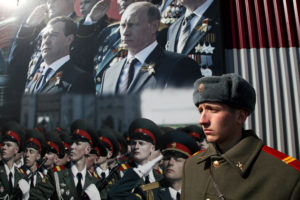 Like the United States, Russia has no regard for the principle of non-interference in the domestic affairs of other countries. More to the point, President Vladimir Putin has made clear his intent to interfere whenever and wherever possible to reclaim as much of the sphere of influence the Soviet Union wielded during the Cold War:
Like the United States, Russia has no regard for the principle of non-interference in the domestic affairs of other countries. More to the point, President Vladimir Putin has made clear his intent to interfere whenever and wherever possible to reclaim as much of the sphere of influence the Soviet Union wielded during the Cold War:
Putin is possessed by such delusions of grandeur that he is aching for a rematch of the Cold War to avenge what he famously claims was ‘the greatest geopolitical catastrophe’ of the 20th century, namely, the disintegration of the Soviet Union. …
The danger of course is that Putin knows the only way he can play on the world stage is to flex his military muscles. And he seems quite willing to do so to feature Russia’s role in the economic-superpower dynamic the United States and China are now playing out.
(“Russia: The Restoration of Vladimir Putin,” The iPINIONS Journal, March 5, 2012)
What’s more, where Russia cannot reclaim Soviet-style influence, namely in Western democracies, Putin has demonstrated a cunning intent to sow destabilizing discord. This was the aim and unprecedented effect of Russia’s infamous invasion of American democracy during the 2016 US presidential election.
Accordingly, Russia is all too happy to stand with China in backing Maduro. More to the point, Cold-War ideations explain why Putin is testing Trump’s nerve by deploying Russian troops to Venezuela, aping the way Soviet leader Nikita Khrushchev tested JFK’s by deploying nuclear missiles to Cuba.
‘Russia has to get out. If Russia doesn’t leave Venezuela,’ Trump said: ‘We’ll see,’ re-asserting that ‘all options are open’ – amid the political, economic crisis and a push for regime change being pursued by the Trump administration.
(Caribbean News Now, March 29, 2019)
Unfortunately, Trump’s record of “we’ll-see” bluster is such that Putin has good reason to believe he has nothing to fear but fear itself. In other words, Trump does not have the cojones to kick Maduro out of Venezuela; you know, the way George H.W. Bush kicked Manuel Noriega out of Panama. And everyone knows he won’t lift a finger, let alone deploy US troops, to kick the Russians out.
To be fair, though, one can hardly blame Putin. After all, since the end of the Cold War, America seeking to enlist every member of the Warsaw Pact into NATO has defined the geopolitics of Europe.
In “Bush Digs His Spurs into Butt of Already Scorned Russian Bear,” April 2, 2008, I warned that this was needlessly pushing Russia into a corner. Moreover, that it was bound to provoke, if not goad, Putin into replaying the dynamics of the Cold War.
For a little perspective, in “Putin Took Crimea More Out of Resentment and Fear than Imperial Ambition,” March 24, 2014, I asked:
How do you think any American president would feel if Russia struck a military alliance with Nicaragua, Venezuela, and Cuba? Especially if that alliance not only called for Russia to fortify them with all of the latest military hardware, including long-range missiles and missile defense systems, but also pledged that any act of aggression against any of them shall be deemed an act of aggression against Russia too.
The point is that Russia is only doing in Venezuela today what America has been doing all over Eastern Europe for years, including as late as 2017 when it enlisted Montenegro into NATO. This raised its membership to 29 – nearly doubling the 15 it had when the Cold War ended in 1989.
Incidentally, Putin began his Cold-War-reclamation mission by emulating Stalin at home and throughout “The Near Abroad.” I presaged his machinations in this respect in commentaries like “President Putin Reforming Russia in His Own Image,” March 25, 2005, and “The Putinization of Russia Extends to Georgia,” November 2, 2006.
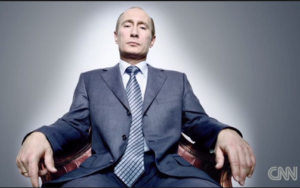 But nothing betrays Putin‘s intent to expand Russia’s sphere of influence (or sphere of interests) quite like the way he’s playing godfather to like-minded dictators around the world.
But nothing betrays Putin‘s intent to expand Russia’s sphere of influence (or sphere of interests) quite like the way he’s playing godfather to like-minded dictators around the world.
Russia has been steadily expanding its military influence across Africa, alarming Western officials with increasing arms sales, security agreements and training programs for unstable countries or autocratic leaders.
(The New York Times, March 31, 2019)
Putin reclaimed Crimea without firing a shot. He can be forgiven for thinking he can reclaim a sphere of influence throughout the Americas in similar fashion. This, especially given that Trump is even less likely to risk war with Russia to enforce his red line against Maduro than Obama was to enforce his against Assad.
In any event, nobody is happier than Putin to see history repeating itself — in this and many other respects.
Epilogue
As indicated above, China has shown no compunction about leveraging its economic influence to affect political outcomes that further its national interests. But, unlike the United States and Russia, China prides itself on non-interference in the domestic affairs of other countries.
China couldn’t care less if the country it’s dealing with is a Jeffersonian democracy or a Hitlerian dictatorship, so long as that country is stable enough to do business. This is why, even though it supports Maduro as the legitimate president of Venezuela, China is loath to use the economic leverage it has over countries throughout the Americas and beyond to force them to support him.
But there’s no denying the vested interest both China and Russia have in seeing countries abandon Western-style democracy to adopt their totalitarian style of governance. Obviously, the more totalitarian regimes become the norm, the more secure their totalitarian regimes become, respectively.
Finally, as long as this commentary is, I am not even commenting on the way Trump is
- fraternizing with so many dictators, it seems this leader of the free world has more vested in normalizing totalitarian regimes than the leaders of Chinaand Russia;
- assailing Canada so much, it seems America considers North Koreaa better ally;
- kindling passage of the United States-Mexico-Canada Agreement with hollow but reckless threats to close the US-Mexico border; and
- encouraging the totalitarian tendencies of the “Trump of the Tropics,” namely Brazilian President Jair Bolsonoro.
Of course, Mitt Romney famously warned that Trump is a fake and a fraud. But I’m bushed …
Related commentaries:
China buying political dominion… China putting squeeze on The Bahamas… China bans Dalai Lama… China’s deficit… Separating families… Migrant Caravan… China invading US… World beware… Loans to colonize world… CARICOM groundhog… Consolidating ties with Venezuela… Countries queuing up to become indebted… PetroCaribe… Cry for Venezuela… the restoration… Crimea… Putin reforming Russia… Putinization of Russia…
